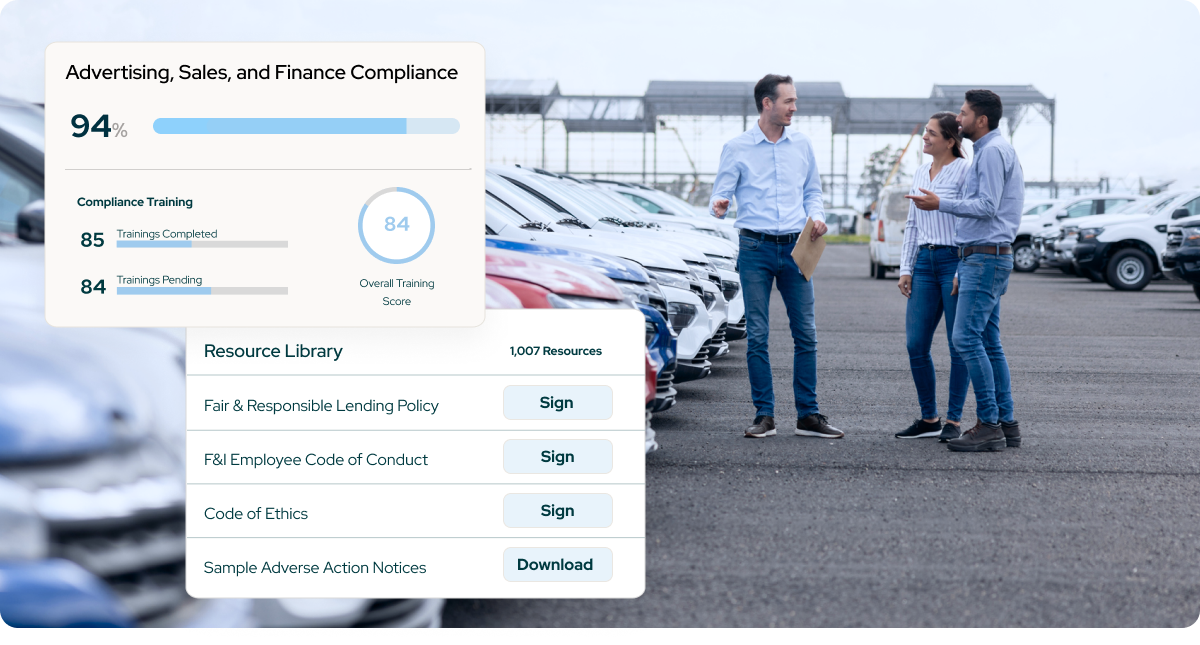In the complex world of auto dealership operations, one aspect that often doesn’t get the spotlight it deserves is the management of licenses and permits. Yet, this seemingly mundane task forms the very foundation of a dealership’s legal and regulatory compliance. Mismanagement in this area can lead to severe consequences, from operational disruptions to hefty fines and even forced closures. As we delve into Step 9 of our compliance journey, let’s explore why mastering license and permit management is crucial for your dealership’s success and longevity.

Key Licenses and Permits for Auto Dealers
Auto dealerships require a variety of licenses and permits to operate legally. These typically include:
- Dealer’s license
- Sales tax permit
- Vehicle VIN Numbers
- Finance and insurance licenses
- Environmental permits (for service departments)
- Business licenses and zoning permits
- Equipment-specific licenses and certifications
Each of these documents comes with its own set of requirements, renewal dates, and regulatory bodies overseeing them. These licenses’ sheer number and variety underscore the complexity of staying compliant.
Challenges in License and Permit Management
Managing licenses and permits is no small feat. Dealerships often struggle with:
- Keeping track of multiple expiration dates across various departments
- Managing renewals in a timely manner
- Storing and accessing documentation when needed, especially during surprise inspections
- Staying abreast of changing regulations that might affect licensing requirements
If not addressed effectively, these challenges can lead to compliance gaps that put the dealership at risk.

Quick Guide to FTC Advertising Compliance
Is Your Advertising in Compliance with FTC Regulations? Find out with this Dealership Advertising Cheat Sheet.
The Importance of Proactive License Management
Taking a proactive approach to license and permit management offers numerous benefits:
Best Practices for Effective License and Permit Management
To overcome the challenges and reap the benefits of good license management, consider implementing these best practices:
- Centralize Information:
Keep all license and permit information in one easily accessible location. - Implement a Reliable Tracking System:
Use a system that allows you to monitor expiration dates and renewal requirements for all your licenses and permits. - Set Up Automated Reminders:
Ensure you’re alerted well in advance of any upcoming renewals or expirations. - Assign Clear Responsibilities:
Designate specific individuals or roles responsible for managing different licenses. - Conduct Regular Audits:
Periodically review your license status to ensure nothing has fallen through the cracks.
Leveraging Technology for License Management
In today’s digital age, manual tracking of licenses and permits is outdated and prone to errors. Modern technology solutions offer features that can significantly streamline this process:
- Centralized digital storage for all license-related documents
- Automated tracking of expiration dates with customizable notifications
- Ability to attach and store related documents, such as inspection reports
- Reporting and export functions for easy sharing of information with regulatory bodies or management
By leveraging such technology, dealerships can turn license management from a burdensome task into a streamlined, efficient process.
Integrating License Management into Overall Compliance Strategy
Effective license and permit management shouldn’t exist in a vacuum. It should be an integral part of your dealership’s overall compliance strategy. This integration can involve:
- Connecting license management data with other compliance efforts for a holistic view of your dealership’s regulatory standing
- Using license management data in regulatory reporting to demonstrate your commitment to compliance
- Incorporating license status checks into regular dealership audits
Training and Communication
For any license management system to be effective, your team needs to understand its importance and how to use it. Consider:
- Educating staff on the critical nature of license compliance and its impact on the dealership
- Establishing clear processes for reporting and updating license information
- Providing regular updates to management on license status and any potential issues
Securing Your Dealership’s Future Through Diligent License Management
In the grand scheme of dealership operations, license and permit management might not seem like the most exciting topic. However, it’s a critical foundation for your dealership’s compliance and overall success. By implementing robust management practices and leveraging modern technology solutions, you can turn this potential pain point into a streamlined process that contributes to your dealership’s reputation, legal standing, and bottom line.
Remember, effective license and permit management is not just about avoiding problems—it’s about creating a culture of compliance that permeates all aspects of your dealership’s operations. As we move towards the final step in our compliance journey, consider how you can elevate your license and permit management to secure your dealership’s future in an increasingly complex regulatory landscape.
KPA helps dealers limit liability from the first contact to deal close.
With our complete compliance system and a team of advertising, sales, and finance compliance experts to guide you, protect your dealership, save money, and recapture countless hours of wasted time.
This structured approach ensures that dealerships are compliant and continually improve their compliance practices, leading to safer, more trustworthy operations.
Next week let’s look at Regulatory Reporting.
Stay up to speed on the 10 steps to complete advertising sales and finance compliance. If you haven’t already, subscribe to our blog for weekly installments of the 10 steps to complete compliance.
Related Content
Explore more comprehensive articles, specialized guides, and insightful interviews selected, offering fresh insights, data-driven analysis, and expert perspectives.



